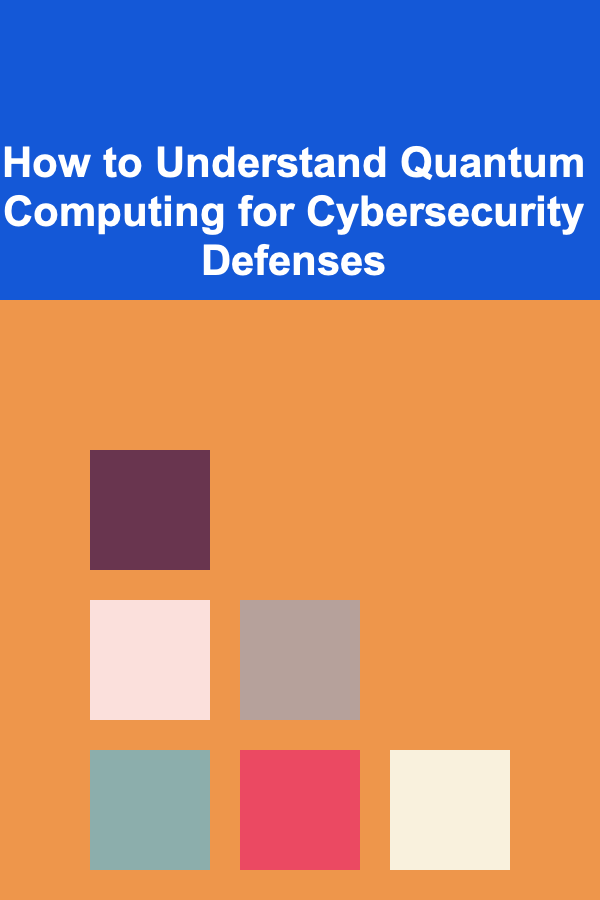
How to Understand Quantum Computing for Cybersecurity Defenses
ebook include PDF & Audio bundle (Micro Guide)
$12.99$5.99
Limited Time Offer! Order within the next:

Quantum computing has been a subject of immense interest for decades, primarily due to its potential to revolutionize a multitude of fields, including artificial intelligence, chemistry, material science, and notably, cybersecurity. As the current world increasingly becomes reliant on digital infrastructures, securing sensitive information from evolving threats becomes paramount. Enter quantum computing---its future role in cybersecurity promises to be both disruptive and transformative.
But to understand how quantum computing can influence cybersecurity defenses, it's essential to first unpack what quantum computing is, how it differs from classical computing, and why it poses both a threat and an opportunity for cybersecurity. This deep dive will explore quantum mechanics' role in computing, quantum encryption techniques, its impact on existing cryptographic methods, and the future landscape of cybersecurity in a quantum-enabled world.
The Basics of Quantum Computing
To understand how quantum computing impacts cybersecurity, we must first grasp the basics of quantum mechanics---the field of physics that quantum computing is built upon.
Quantum Mechanics: A Brief Overview
Quantum mechanics deals with the behavior of particles at the microscopic level. Unlike classical physics, which follows predictable laws, quantum mechanics is based on principles that can seem counterintuitive, such as superposition, entanglement, and uncertainty. These principles give quantum systems the ability to exist in multiple states simultaneously or be connected in ways that defy classical logic.
In quantum computing, qubits (quantum bits) serve as the fundamental unit of information. Unlike classical bits, which are either 0 or 1, qubits can represent both 0 and 1 at the same time, thanks to the principle of superposition. This allows quantum computers to process vastly larger datasets and solve problems that classical computers cannot efficiently handle.
Quantum Computing vs. Classical Computing
The key difference between classical and quantum computers lies in the way they process information. Classical computers rely on bits to perform calculations, which are either 0 or 1. These bits can be manipulated using logic gates to perform complex tasks.
Quantum computers, on the other hand, utilize qubits that, due to superposition, can exist in multiple states simultaneously. This enables quantum computers to perform certain types of computations exponentially faster than classical computers, especially when it comes to solving problems that involve large numbers of variables or complex optimization tasks.
Quantum Algorithms and Their Applications
Quantum computers rely on specialized algorithms, such as Shor's Algorithm and Grover's Algorithm, which can potentially break classical cryptographic protocols and significantly speed up computations for certain tasks.
- Shor's Algorithm, for instance, could potentially break widely used public-key cryptographic systems like RSA and ECC by efficiently factoring large numbers.
- Grover's Algorithm, on the other hand, could speed up searching through unsorted databases exponentially.
These capabilities make quantum computers a double-edged sword for cybersecurity. While quantum computing holds immense promise, it also presents significant risks to existing security protocols.
The Quantum Threat to Cybersecurity
Cybersecurity primarily relies on encryption to protect sensitive data from unauthorized access. Encryption schemes like RSA and Elliptic Curve Cryptography (ECC), which are foundational to modern security systems, are based on mathematical problems that are computationally difficult for classical computers to solve. However, these cryptographic protocols are vulnerable to the power of quantum algorithms.
The RSA and ECC Vulnerabilities
RSA and ECC both rely on the difficulty of certain mathematical problems---specifically, the factoring of large numbers (RSA) and the discrete logarithm problem (ECC). In classical computing, these problems take an impractical amount of time to solve as the numbers involved become larger. Quantum computers, however, can solve these problems much more efficiently using Shor's Algorithm.
For example, Shor's Algorithm can break RSA encryption in polynomial time, which would allow an adversary to decrypt sensitive messages that rely on this form of encryption. Similarly, ECC, which is often used in applications like SSL/TLS certificates and secure messaging, would also be compromised in a quantum-enabled future.
The Risk of Quantum-Enabled Attacks
Quantum computers, once fully developed, could easily decrypt encrypted communications, access sensitive data, and even undermine the entire infrastructure of the internet as we know it. This poses an existential risk to global cybersecurity systems, which rely on the current cryptographic methods.
The sheer computational power of quantum computers could render existing encryption standards obsolete. For instance, data that is being encrypted today with RSA or ECC might be intercepted and stored by attackers with the intention of decrypting it once quantum computers become powerful enough.
This highlights a critical issue: the growing urgency for quantum-resistant cryptography, or post-quantum cryptography, which is specifically designed to protect data from quantum-enabled attacks.
Quantum Cryptography: A New Frontier in Cybersecurity
While quantum computers can pose a significant threat to classical encryption methods, they also offer promising solutions through quantum cryptography. Quantum cryptography leverages the principles of quantum mechanics to create encryption systems that are, in theory, immune to attacks by quantum computers.
Quantum Key Distribution (QKD)
One of the most notable advancements in quantum cryptography is Quantum Key Distribution (QKD) . QKD allows two parties to securely exchange cryptographic keys using the principles of quantum mechanics. The most famous QKD protocol is BB84, proposed by Charles Bennett and Gilles Brassard in 1984.
The fundamental concept behind QKD is that quantum particles (such as photons) are used to transmit cryptographic keys. Any eavesdropping attempt on the quantum key exchange would disturb the quantum states of the particles, thus alerting the parties involved to the presence of an attacker. This is known as the no-cloning theorem, which states that it is impossible to create an identical copy of an unknown quantum state without disturbing it.
Quantum-Resistant Encryption Methods
While QKD promises to provide secure communication, it is not without its challenges. Quantum key distribution requires specialized hardware and infrastructure, and its current implementation is limited by distance and environmental factors.
However, beyond QKD, there is a rapidly growing field of post-quantum cryptography (PQC). PQC aims to develop encryption algorithms that are resistant to quantum computer attacks, without relying on quantum key distribution. These new cryptographic methods include lattice-based cryptography, hash-based cryptography, and code-based cryptography. The goal of PQC is to create algorithms that can resist quantum attacks while still being computationally feasible on classical computers.
The National Institute of Standards and Technology (NIST) has been leading the effort to standardize post-quantum cryptographic algorithms. Their ongoing competition aims to select the most secure and practical PQC methods that can be adopted by organizations globally.
How Quantum Computing Will Change Cybersecurity Practices
The advent of quantum computing will likely reshape cybersecurity practices in several key ways. While traditional encryption schemes may become obsolete, new methods of securing data and communications will arise. Below are some key changes that quantum computing will bring to the cybersecurity landscape.
1. A Shift Toward Post-Quantum Cryptography
As quantum computers become more powerful, there will be a significant push toward adopting quantum-resistant encryption. Organizations and governments will need to start implementing post-quantum cryptographic algorithms to safeguard sensitive data. The transition to these new encryption methods will require careful planning, as systems must be backward-compatible with classical encryption while simultaneously adopting quantum-resistant techniques.
2. Enhanced Security with Quantum Key Distribution
In the realm of secure communications, quantum key distribution (QKD) will be one of the most promising advancements. Although still in its infancy, QKD systems will likely be implemented for high-value communications where absolute security is paramount. Governments, financial institutions, and critical infrastructure sectors will lead the charge in deploying QKD systems to protect their communications from future quantum attacks.
3. Increased Focus on Quantum-Safe Networks
To prepare for a quantum-enabled future, cybersecurity professionals will need to develop quantum-safe networks that can handle both classical and quantum encryption methods. This will involve building hybrid systems that can seamlessly transition between classical encryption and quantum-resistant protocols as the need arises.
4. New Threats and Attack Vectors
While quantum computers will enhance security in some areas, they will also introduce new types of attacks that are difficult to predict. The rise of quantum-enabled cyberattacks will require cybersecurity teams to constantly evolve their defenses and adopt a proactive, forward-thinking approach to security.
Conclusion: Preparing for a Quantum Future
The convergence of quantum computing and cybersecurity is an exciting and challenging frontier. Quantum computing promises to reshape the digital landscape by both challenging existing encryption methods and offering new possibilities for secure communication and data protection.
While the full-scale deployment of quantum computers may still be years away, organizations must prepare for the inevitable shift. Understanding the basics of quantum mechanics, quantum computing, and quantum cryptography is essential for cybersecurity professionals to develop resilient defenses against future threats. The race is on to develop quantum-safe encryption methods, and the organizations that can successfully transition to post-quantum cryptography will be the ones to thrive in the quantum future.
As quantum computing continues to advance, it will not only change the way we think about cybersecurity but also redefine the boundaries of privacy, data protection, and digital trust. The future of cybersecurity, in a world empowered by quantum computing, will require both vigilance and innovation.
Reading More From Our Other Websites
- [Organization Tip 101] How to Keep Your Car Organized for Family Trips
- [Home Renovating 101] How to Incorporate Natural Elements into Your Home Renovation
- [Home Pet Care 101] How to Naturally Reduce Pet Anxiety: Safe and Effective Home Remedies
- [Personal Investment 101] How to Use Dollar-Cost Averaging to Minimize Investment Risks
- [Sewing Tip 101] Preserving Tradition: A Look at Historical Hand‑Sewing Techniques and Their Modern Applications
- [Biking 101] How to Plan Your Next Adventure with a Bike Route Planner
- [Home Holiday Decoration 101] How to Set Up Elegant Holiday Table Settings for Your Meals
- [Whitewater Rafting Tip 101] Choosing the Perfect Rafting Life Jacket: A Comprehensive Buyer's Guide
- [Home Space Saving 101] How to Use Clever Storage Ideas to Maximize Your Apartment Space
- [Personal Care Tips 101] How to Apply Eyeliner on Monolids

How to Attract Your First Writing Client: Tips for Beginners
Read More
How To Understand Robot Embodiment and Cognition
Read More
How to Research Marine Genetics: A Comprehensive Guide
Read More
10 Tips for Wildlife Photography Checklist: Gear & Safety
Read More
10 Tips for Version Control Planning in Coding
Read More
10 Tips for Organizing Your Painting Supplies
Read MoreOther Products

How to Attract Your First Writing Client: Tips for Beginners
Read More
How To Understand Robot Embodiment and Cognition
Read More
How to Research Marine Genetics: A Comprehensive Guide
Read More
10 Tips for Wildlife Photography Checklist: Gear & Safety
Read More
10 Tips for Version Control Planning in Coding
Read More